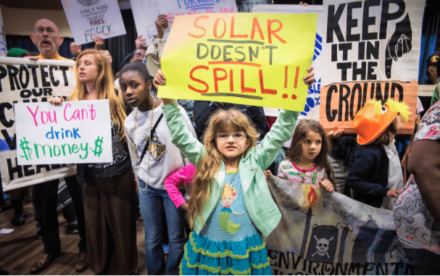HISTORY
ALERT founder Riki Ott witnessed first hand the Exxon Valdez oil spill in Prince William Sound, Alaska in 1989, and became an “accidental activist” in its wake. Ott was instrumental in supporting the community through the process of establishing the first citizen advisory council in Alaska post-spill to create citizen oversight of oil-chemical activities.
From 1989 to the beginning of 2010, Riki was a voice for holding the oil industry and state accountable, and stewarding a replicable model in protecting the human and environmental health of communities and workers in oil spill response and oil-chemical disasters.
Here is an account of how a concerned citizen turned "accidental activist" spearheaded a movement for change.
March 23
The day before the Exxon Valdez oil spill, the future Alert Project founder and director Riki Ott presented before the Valdez, Alaska Mayor’s Committee on behalf of United Fishermen of Alaska, repeating a talk given six-weeks earlier at the International Oil Spill Conference in Texas: “It’s not a matter of if, but when an oil disaster happens...”
March 24
The Exxon Valdez ran aground in Prince William Sound, Alaska, spilling 11–33 million gallons (Exxon’s estimate and the State of Alaska’s estimate, respectively) of crude oil to become the nation’s largest oil spill.
April
Riki testified at numerous U.S. Congressional hearings and became the spokesperson for frontline Alaska fishermen.
June
Co-formed the Oil Reform Alliance, a coalition of commercial fishermen and environmental groups, to pass strong oil spill prevention and response laws, resulting in multi-year lobbying efforts
January - May
Spearheaded grassroots lobby efforts of the Oil Reform Alliance to successfully pass series of Alaska state laws strengthening oil preparation and response and fiscal accountability over intense objections and lobbying by the oil industry.
August
Contributed to writing and passage of the Oil Pollution Act, including sections on double-hull tankers, involvement of local government and citizen advisory councils in oil spill preparation and response, an Oil Spill Recovery Institute in Prince William Sound and a Presidential Audit of Alaska Pipeline

January - May
Testified at a series of Alaska legislative hearings on “Ballast Watergate,” triggering state and federal investigations into, and halting the practice of, transferring and running hazardous and toxic oil-contaminated ballast water from west coast states and Hawaii to north-bound tankers for illegal disposal at the Alyeska tanker terminal
February
Filed complaint and triggered an investigation by the Alaska Ombudsman after the Alaska Dept. of Environmental Conservation released the new oil spill prevention and response regulations to the oil industry prior to their public release and then delayed the public release, based on industry’s objections (In August, the Ombudsman concluded that the state had acted unethically but there was no firm evidence of improper influence by oil industry)
November
Attended Congressional oversight hearing on Alyeska Pipeline Service Company’s covert operation on industry critics, including Riki, to find internal sources of company leaks who were revealing systemic operational problems
January - May
Contributed to content for regulations of oil laws and wrote bill to strengthen state laws protecting oil and gas industry whistleblowers
February
Briefed the incoming Clinton Administration on severe structural integrity issues and lax government oversight of the Trans Alaska Pipeline System, triggering the Presidential Task Force audit required by the Oil Pollution Act
April
Organized diverse small group of Alaskans, “the Truth Squad”, to attend the first national public presentation of Exxon-funded “science” in Atlanta, GA; the Truth Squad discredited Exxon’s story that fish, wildlife and communities had recovered from its 1989 oil spill – ultimately resulting in out-of-court settlement with Alyeska consortium (1998)
August
Organized fishermen’s blockade of Valdez Narrows in response to the collapse of major pink salmon and herring fisheries in Prince William Sound, Alaska, resulting in an agreement with U.S. Sec’y of Interior and President Clinton to fund long-term comprehensive ecosystem studies in Prince William Sound to determine if the long-term harm was related to the 1989 oil disaster
November
Congressional House Energy and Commerce Committee oversight hearing on field audit of Trans Alaska Pipeline System confirmed whistleblowers’ claims that issues posed an imminent threat to pipeline integrity, worker safety and the environment; oil pipeline owners decided to conduct audit with their own consultants
December
Riki was invited as a keynote speaker at the one-year memorial international symposium on the Aegean Sea oil spill in Coruna, Spain
Riki co-founded Alaska Forum for Environmental Responsibility to provide citizens’ oversight of the Trans Alaska Pipeline System (TAPS) operations with funds from settlement of invasion of privacy lawsuit against TAPS oil company owners.
1996
AFER issued Pipeline in Peril report on status of the Trans Alaska Pipeline audit issues contradicted the rosy evaluation by U.S. General Accounting Office report and documented persistent and serious shortcomings that continue to jeopardize system-wide integrity and operations
